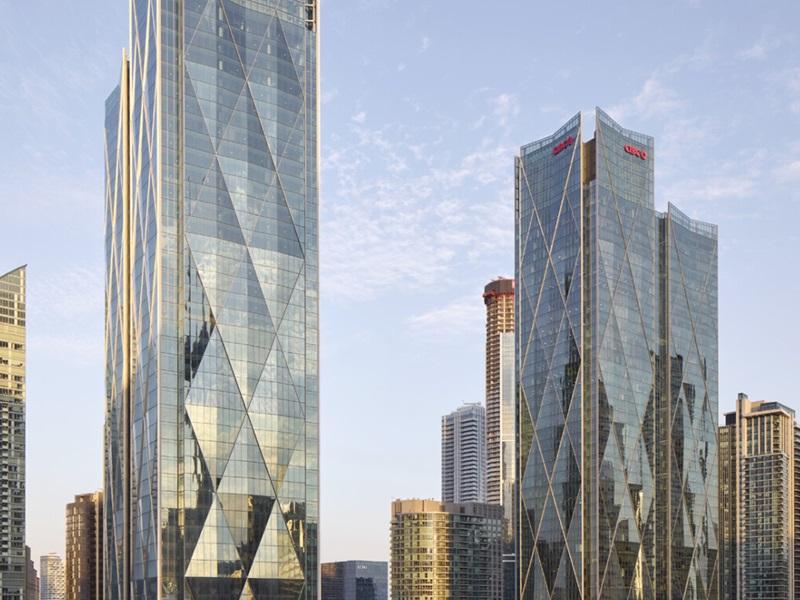
This Church St. property at the edge of downtown Oakville, which has multifamily redevelopment potential, sold for $296 per buildable square foot during Q1 2020. (Google Street View)
A decline in the value of Greater Toronto Area land transactions for multifamily development sites during Q1 2020 can be attributed to the location of the properties, not the COVID-19 pandemic, according to market expert Ben Myers.
The average estimated sales price for 39 Greater Toronto Area (GTA) land transactions with future development potential for condominiums or rental apartments was $103 per buildable square foot (pbsf), says the GTA High Rise Land Insights Report.
The report, from real estate advisory firm Bullpen Research & Consulting and urban planner and project manager Batory Management, says these sites averaged 1.2 acres and sold for an average of $21 million. Their potential for future projects averaged 303,000 square feet of gross floor area and 18 storeys in height.
The report estimated residential condo units at these projects could sell for an average of $967 per square foot at the time of the land sale, which indicates developers paid about 11 per cent of expected revenue for the land.
The average land price declined both on a quarterly and annual basis, dropping to $103 pbsf from $111 and $119 respectively. Myers, the president of Bullpen, said fewer land transactions in high-end neighbourhoods like Rosedale, Forest Hill, Yorkville and downtown core locations pulled down the average price.
There’s volatility with such a small sample size, however, and the numbers reflect land transactions in varying locations, various stages of entitlement and different risk profiles.
416 versus the 905 area code
Prices were down 13 per cent year-over-year to $117 pbsf in the 416 area code and up by that same percentage to $68 pbsf in the suburban 905 area code during the quarter.
Myers attributes this to more transactions in Scarborough Junction, Guildwood in Scarborough and Downsview on the fringes of 416, where land prices are lower than in the core. The 905 price was pulled up considerably by a $296 pbsf transaction in downtown Oakville.
“In that small downtown Oakville area, projects are selling at $1,000 to $1,500 per square foot,” said Myers. “There’s demand from affluent people who have lived in Oakville their entire lives and had a large detached home and are looking at trading down.
“They’re used to a certain level of luxury and a certain unit size and they want to be right in that walkable core. There’s not a lot of height allowed in that area, so the land is really valuable.
“It’s a bit of a slower sell, but there’s a profit to be made there catering to high-end buyers.”
At the other end of the spectrum, the lowest-priced GTA transaction was $20 pbsf for a 3.8-acre property in Milton.
“There are very few rental apartments in Milton, so the condo stock has really acted as the rental supply in the marketplace,” said Myers. “Milton has been a fast-growing place, so there’s more demand for rentals than there has been in the past.
“There’s also demand from move-down buyers who may be moving out of Mississauga and looking for some less expensive condominiums.”
Pre-zoned land is usually more valuable than properties less further along in the entitlement process because of its lower risk, but that wasn’t as evident in the first quarter.
“Maybe, in some instances, developers are confident in their ability to get something approved and they want to buy something now, knowing they’re going to sell it in a future market where they anticipate that pricing will be higher than today,” said Myers.
Impact of COVID-19

Ben Myers of Bullpen Consulting.
While the Canadian economy was largely frozen in late March due to the COVID-19 pandemic, it had little effect on first-quarter land sales. It will, however, play a growing role in coming months.
Myers said a couple of developers told him they dropped deals for sites they intended to purchase once the seriousness of the pandemic became known. Others, however, continued to secure financing for acquisitions and program unit mixes and sizes.
Batory is also working with clients which extended due diligence periods in response to the pandemic.
The expectation is for fewer transactions in 2020 as the industry takes a cautiously optimistic approach to acquisitions and lenders tighten underwriting standards and focus only on their best clients.
“If there ends up being more conservative developers and conservative lenders, it might have an impact on supply,” said Myers.
“But, considering that a lot of these transactions are being bought pre-application, and it takes two to three years to get these projects approved, the impact may not be for a fairly long time.”
The report says many existing condo projects with significant sales in place will hold and wait out the virus.
Other sites needing sales to qualify for construction financing will likely offer incentives like extended deposit structures, capped development charges, rental guarantees and other bonuses to attract buyers.
Condo unit investors may be growing more wary
A flattening of the new condo price curve is expected along with a short-term decline in rental rates, which will likely scare off some investors in the summer and fall.
That would impact absorption this year and influence how a developer looks at a proposed site from a total gross floor area perspective.
Myers said there had already been some flatness in downtown Toronto condo rents over the last year. With the onset of fears regarding COVID-19’s impact, some condo unit investors could panic if they can’t find the tenant or rent they want and try to sell their suites.
“The majority of investors who are buying condominiums to rent them out in this market view it as a long-term investment. They see the long game and Toronto as a very desirable place to live.
“We’ve essentially had 25 consecutive years of new condo pricing going up, which is an unbelievable thing to say.”
Since most people buy condo units in the pre-construction stage, it could still take from three to six years for occupancy to occur.
“The less units that get bought now mean supply will decline in the future, meaning it will cause rents and prices to go up in the future,” said Myers.
“Eventually we’ll find an equilibrium, but I think there will be a short-term disturbance to the market since COVID-19 will cause people to make more short-term decisions as opposed to long-term decisions.”







